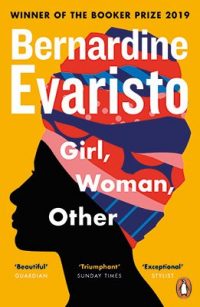The spiteful snake that slithers out of her tongue to hurt her mother
 Girl, Woman, Other
Girl, Woman, Other
by Bernardine Evaristo
This novel is funny, smart and encompasses so much through the specifics of its 12 narrators.
It starts and ends with Amma, a playwright who, after years of struggling to make ends meet while making gay, feminist art, is finally on the brink of success. Subsequent narrators include her daughter, mother and closest friends, as well as people who seem to be unconnected at first. We’re given a potted history of each person along with some degree of meeting them “now”, learning how they are connected to Amma and her premiere.
Evaristo’s style is engaging; sometimes funny and sometimes serious; issues-driven without sacrificing storytelling. What is most immediately noticeable is that it is written in fragments not sentences, which seemed like it might be challenging, but I loved it. It gives the novel a quality similar to natural conversation but more elegant.
“Amma misses her daughter now she’s away at university
not the spiteful snake that slithers out of her tongue to hurt her mother, because in Yazz’s world young people are the only ones with feelings
but she misses the Yazz who stomps about the place
who rushes in as if a hurricane’s just blown her into a room – where’s my bag/phone/bus pass/books/ticket/head?
…the house breathes differently when Yazz isn’t there
waiting for her to return and create some noise and chaos
she hopes she comes back home after university
most of them do these days, don’t they?”
Most of the narrators are gay black women, and some of the details of their lives are defined by their race, gender or sexuality, but they are all complex individuals and quickly established as such. In fact, my only criticism of this book is that in some chapters I fell completely in love with the narrator and was sad at the end of the chapter that I wouldn’t hear from that voice again.
In some cases, the switching narrators mean we get to read about the same events from multiple perspectives and this is handled well (I’ve seen it horribly over-egged in other books). But just as often, the point being made is that those “minor characters” in our lives actually do have their own full lives. Evaristo manages to bring to life in relatively few words not only her 12 narrators but every minor character too.
“he joined the police when he left school, had been bullied by his brothers when he was growing up because he was a soft lad
that changed once he had the full force of the law behind him
he once asked her if she paid taxes on the farm’s cash income
she wasn’t sure whether it was a friendly enquiry or a threat
you don’t know where you stand with Alan
not felt the same about him since”
This book achieved that old cliché of making me both laugh and cry. It also references a lot of other writers, significantly expanding my to-read-list (because I always think if I like a writer, I will probably like the works they reference). I loved this novel so much I immediately added three more Evaristo novels to my wishlist too.
Published 2019 by Hamish Hamilton.
Source: Storysmith.